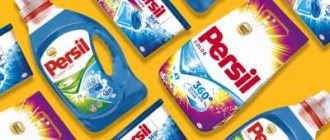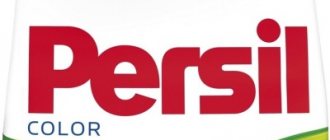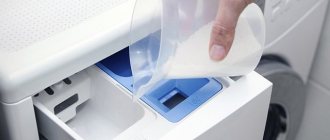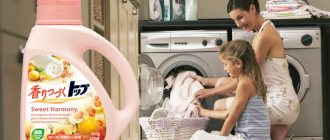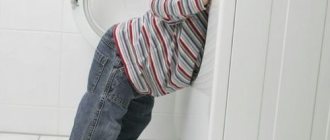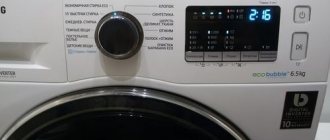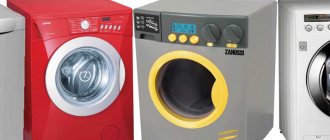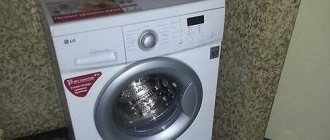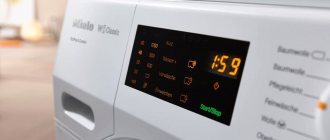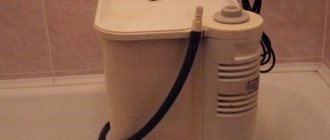Nowadays, the choice of washing powders is huge. On store shelves you can see many names, types, manufacturers, etc. Looking at the composition, you should even start to panic a little: a large number of unknown letters, numbers and words.
Today, the safest are phosphate-free powders. It’s worth figuring out what kind of beast this “phosphate” is and why it’s dangerous.
- Harm from phosphates
- Why are phosphates added?
- Composition and benefits
- Choosing the best powder
- Consumer Reviews
Harm from phosphates
Each laundry detergent contains the main components, thanks to which the ideal cleanliness of things is achieved. Such as:
- Surfactants are what actually washes fabric, removes dirt and paint. The surfactant helps accelerate dissolution in water. The norm is the content of such components is no more than 30%, ideally 5-20%. At the moment, there are natural analogues that are safe.
- Active and aggressive action of other components. By the way, European countries have completely abandoned their use.
- Phosphonates are a more environmentally friendly analogue of phosphates.
- Zeolites - these compounds are less dangerous. But they can cause allergies due to the fact that they wash away the protective layer of fat from human skin. The maximum permissible volume is 1/3 of the contents.
Baby powder "Nanny"
Consequences of using “dangerous” powders:
- Allergies, rashes, dermatitis. Burns.
- Capable of corroding skin.
- Metabolic disease
- Reduced amino acid content.
- Development of cancer.
- Infertility. Both male and female.
- Deterioration of the immune system.
- Negative impact on the functioning of internal organs.
Are you unplugging your washing machine?
Oh yes! No
What is the difference between phosphate-free powder: composition
When buying laundry detergent without phosphates, you cannot be sure that you will receive a product without surfactants or other unsafe ingredients. It’s easier to immediately figure out which substances are the most harmful and look at the label of the powder yourself - even if it is phosphate-free.
So, let's look at the most harmful components that can be included in the composition:
- A surfactant is the “backbone” of any powder, its basis, which ensures washing efficiency. They accelerate dissolution in water and push out complex contaminants from fabric fibers.
- Phosphates are salts that have excellent solubility in water. They are used to soften water to enhance the effectiveness of other components. Harmful to both humans and nature.
- Phosphonates are an analogue of phosphates that are not so harmful to the environment.
- Zeolites are less dangerous compounds. But at high concentrations they can cause significant damage to human health, as they wash away the protective layer of fat from the skin, which leads to allergic rashes. Compared to phosphates, they are more environmentally friendly. The choice is between your health and the environmental friendliness of the product.
What is the difference between phosphate-free powder and regular powder? The fact that instead of phosphates it may contain the components listed above. Remember their safe dosages:
- Surfactant – from 5 to 20%. More than 30% is dangerous.
- The safe concentration of zeolites should not exceed a third of the total volume of the detergent.
On a note! The release form does not affect the “harmfulness” of the product - it can be powders, concentrated or universal products. The differences are in the composition, and not in their liquid or bulk form. Safe ECO powders contain a minimum of “chemicals” and are often even odorless.
Why are phosphates added?
As stated earlier, harmful compounds serve to achieve an ideal result. All these substances help remove stubborn stains. Fatty, ingrained stains are not so easy to wash off; this is where phosphoric acid salts “help out.”
Expert opinion
Irina. Housewife.
Ask a Question
They work as follows: the compounds help fat molecules connect with water molecules, thereby removing them from the tissue. Already from washed clothes, surfactants get on the skin. The worst thing is that the components have a cumulative effect. That is, they are gradually deposited in the liver, lungs, heart, and brain. And in the end they lead to dire consequences.
Another reason for using harmful substances was saving. You may notice that the cost of safe products is slightly higher. This is due to the higher price of natural, natural compounds. But is it worth choosing between health and savings? This is everyone's business.
Phosphate-free product
What is this substance?
Phosphates are natural compounds that combine mineral phosphorus, hydrogen and oxygen. This is a class of salts produced by the chemical reaction of phosphoric acid with other elements.
Phosphates are used in the detergent composition industry and are universal. They are a key ingredient in detergents and come in liquid or powder form. Phosphates are detergent builders.
An important functional property of this substance is to increase the cleaning power of the chemical composition.
PH helps in removing grease stains. They also soften hard water. Phosphates remove mineral deposits by binding metal ions. Thanks to this, the water becomes softer and the powder removes contaminants better.
Phosphates have anti-reposition properties and help break large dirt particles into small ones, so household chemicals containing this component can remove almost any stain. This property also prevents dirt from settling on items during the wash cycle.
Composition and benefits
The question arises: “How to wash things without these components?” Yes, without their maintenance it is almost impossible to achieve cleanliness, but minimizing it is quite possible. The fact is that in small quantities such compounds are unlikely to cause harm, since they will not have time to linger inside the body.
Most European countries have established restrictions - no more than 2% of the content of harmful components. Russia has a minimum threshold of 5%, this level will definitely be safe. The standard is 25-30%. And in some it reaches 50-60%.
And also as a precaution, it is recommended to rinse the laundry with hot water 3-6 times. When hand washing, use rubber gloves.
Are you using citric acid?
Oh yes! No
The composition of a phosphate-free product usually includes:
- Natural, biological surfactants (sugar).
- Vegetable, baby or laundry soap.
- Essential oils, natural.
- Lemon acid.
- Baking or soda ash.
- Salt.
- Rice starch.
- Defoamer.
- Bleach containing oxygen.
- Enzymes (protein molecules) are phosphate substitutes.
- Salts of fatty acids.
Powder without surfactants
Advantages of phosphate-free powders:
- The first is safety. The components completely dissolve when washed with water and leave no marks on clothing or body. This eliminates any allergic reactions and other adverse effects.
- Quality. Despite the absence of a large amount of chemicals, this product can wash even difficult stains in cold water.
- Suitable for the whole family. They can even be used to clean children's clothes. Suitable for babies from the first days of life.
- Versatility. It doesn’t matter what item you wash. This product is harmless to any fabric. The washing mode is also not important.
- Economical. Unlike harmful analogues, this product requires low consumption. Here the system works in reverse: the more you use, the worse it washes. Therefore, despite the higher cost, the costs are much lower.
- Durability. Basically, the shelf life is unlimited, due to the special manufacturing technology.
Do not forget that a phosphate-free product can also be dangerous . By excluding aggressive components, the manufacturer can include something new, no less negative. Carefully study the ingredients before purchasing.
How does it affect the body?
Phosphates in washing powder are not safe for the human body. They are dangerous and harmful, so their access to the market should be closed.
Why are phosphates dangerous for humans?
- disrupt the acid-base balance of the skin;
- cause dermatitis;
- change the percentage of hemoglobin in the blood after penetration through the skin;
- change the protein content in the blood and serum density;
- disrupt kidney and liver functions;
- cause serious poisoning;
- disrupt metabolic processes in the body;
- activate the development of cancer cells;
- provoke exacerbation of chronic diseases.
Each use of phosphate washing powder ends in poisoning the body with these substances. Remember these shocking facts every time you go to the store to buy detergent for washing clothes, especially children's clothes. Therefore, it is worth choosing powders in the same way as products, carefully studying the label.
Choosing the best powder
Imported funds
This is what manufacturers from abroad offer us.
Sodasan Ecologocal Color. A German-made product containing natural soap. Contains herbal extracts and essential oils. All certificates of quality and compliance with standards are available.
Cost: 1, 2 kg 500-600 rubles.
Sodasan Ecologocal Color
EcoDoo.
Detergent from France. Surfactants within normal limits, zeolites, Aleppo soap (base - bay fruits and olive oil), enzymes. Remains effective when used from 30 to 90 degrees. Concentrated, very low consumption. Cost: from 2000 rub. for 3 kg.
EcoDoo products
BioMio Color. Also a German remedy. Everything that could cause harm has been replaced with surfactants and zeolites. Cotton extract is used. According to the manufacturer, a 1.5 kg pack should be enough for 30 uses in the washing machine.
Price: 500 rub.
BioMio Color
Russian goods
Persil. Everyone knows the brand. And despite the fact that the country of origin is Germany, it can be found in any Russian store. There are two types: for colored and white linen. Suitable for hand washing.
Cost: 3 kg 400 rubles.
Mako clean. Using enzymes, BIO - odorless surfactants, natural soap crumbs, soda ash.
Price: 700 rub. for 1350 gr.
BiMAX. The brand is over 15 years old. The composition includes enzymes, biological surfactants, oxygen-based bleaches.
Cost: 1.5 kg will cost 270 rubles.
Children's phosphate-free powders
When buying powder for newborns or older children, it is not enough to be guided by phosphates alone. Not only should the composition not contain harmful “chemicals,” but the concentration of other substances should also be within acceptable limits.
Let's look at some baby products so you can choose the best one.
Karapuz. Phosphates in it are replaced by harmless silicates. And the main detergent component is palm oil. This soap foams well and copes even with old stains. At the same time, the fabric becomes soft and does not smell of foreign odors.
Burti is an expensive premium German powder. Phosphates are replaced by phosphonates. It washes well, but can cause skin rashes in children.
Stork - the product is made in the Russian Federation. It washes well, but is considered too toxic. The composition includes both anionic and nonionic surfactants. They are poorly washed out of fabrics with 1-2 rinses. After washing, clothes have a sharp and unpleasant smell.
Our mother is a domestic soap-based product. Release form: large chips. The only inconvenience is that the shavings need to be soaked and poured into the SMA as a concentrate. But this is justified by the excellent composition of the product - natural soap, BIO surfactants, oxygen-containing enzymes.
We wrote separately about washing powders for the little ones in the article “Which children’s washing powder is best to choose.”
In conclusion, we can say: the label “phosphate-free” does not always mean “safe”. Look carefully at the label of the detergent; it may contain other harmful components. You should be especially careful when choosing children's products.
Russian stamps
As you can see, phosphates are really very harmful substances. Therefore, in Europe the production and sale of detergents containing them is prohibited. You cannot see phosphate-free powders in America either. However, the sale of products containing phosphonates is still permitted in the United States. These substances also significantly improve the working properties of powders, but are less harmful to health. In Russia, the release and sale of such products, unfortunately, is still not prohibited. Most powders available on store shelves contain phosphates.
There are not so many companies in our country that produce harmless products, but they still exist. Most often on store shelves you can see phosphate-free powders of the Chistown and Dacos brands. Also sold are products intended for washing children's clothes: “Alenka”, “Aistenok” and “Our Mother”.
Next, let's see what reviews housewives have about the products of these manufacturers.
Powders “Our Mother”: reviews
This product contains neither phosphates nor phosphonates. Therefore, it can be used to remove dirt from things from the first day of a child’s life. According to most housewives, good washing quality is what distinguishes this phosphate-free powder. Reviews about it are positive, but some note certain disadvantages of this product. So, for example, the product “Our Mother” dissolves very poorly in water. In addition, it does not have a very pleasant smell. Therefore, most mothers advise using it only for washing clothes of a very small child. Next, you can begin to gradually add regular baby powder to it. The “Our Mother” product is made simply from “Extra” soap.
Reviews of Alenka products
Phosphate-free baby powders of this brand are produced not in Russia, but in Ukraine. But, like domestic ones, these products are much cheaper than European ones of the same group. The main advantages of "Alenka" for housewives include the absence of any odor and the ability to use the smallest children's clothes for washing. This brand can be used for both hand and machine washing. Among the advantages of Alenka powder are housewives and its cost-effectiveness. In order to thoroughly wash children's things, you need very little. Moreover, according to the manufacturer, the powder contains only natural ingredients. In any case, judging by numerous reviews, Alenka does not really cause allergies in children.
As for the quality of washing, in this regard this powder does not cause any complaints from young mothers. The only drawback of the product is that it can rarely be found on sale even in Ukraine, not to mention Russia.
What can be replaced?
Phosphates serve a number of functions, making them difficult to replace with a single ingredient. Replacing phosphate powders requires the use of many other components. No single chemical can perform all the tasks inherent in phosphates.
Phosphate-free washing powder will contain the following components:
- Zeolites. These are hydrated aluminosilicates of alkali elements. Valuable industrial materials. Zeolites soften water. Pathogenic organisms accumulate in micropores and pass through sewer systems without hindrance.
- Sodium carbonate is used to maintain alkalinity. It is poorly soluble in water, so this component began to be excluded from powders and added to liquid products.
- Biological surfactants ensure the removal of stains from fabrics. These compounds are organic, have the ability to bind dirt particles, and form foam.
- Laundry soap. This inexpensive environmental product is used both in powders and separately. Soap removes almost any dirt. It effectively removes stains from sweat, urine, paint, and grass.
- Sodium chloride may also be contained in some products. This is an electrolyte. Accelerates the action of active ingredients and enhances their cleaning ability.
- Citric acid copes with washing, lowers the pH level and softens the fabric. If it is included, there is no need to use fabric softeners.
- The defoamer prevents foam from forming. It is added only to detergents for washing machines. If household chemicals are for hand washing, then this substance will not be in the composition.
- Enzymes are biological additives that remove dirt from tissues. Washing powders with enzymes should be used if washing is carried out at a temperature of 30–40 degrees. At high temperatures, enzymes disintegrate and do not perform their functions. Things will remain dirty.
- Phosphate-free powders contain oxygenated bleach. Safe substance, cleans light and colored items well. Has a whitening effect
- Rice starch makes linen soft and pleasant to the touch. Creates pleasant sensations during bodily contact with things.
- Essential oils are added to phosphate-free powders to add a delicate aroma.
Phosphate-free laundry detergents may contain harmful chemicals.
Phosphate removal from detergents alone may not be sufficient to address eutrophication. Phosphate alternatives absorb calcium ions but not magnesium. Additionally, the absorption rate is slower, making them much less effective.
Use in its pure form leads to a decrease in washing power and a significant increase in the re-deposition of dirt on linen, so they also undergo treatment; on the contrary, their washing qualities increase.
Eco-manufacturers of phosphate-free chemicals
You can choose high-quality phosphate-free powder from the following manufacturers and brands:
- Attack (BioEX and Multi-Action series) – Japan;
- BioMio (for color and white) – Denmark, Russia;
- Burti Color (can wash delicate items) – Germany;
- Dalli Wohlfuhl (a series of products with a pleasant floral scent) – Germany;
- Dr. Frank (universal powder) – Germany;
- Ecover (containing biosurfactants) – Belgium.
Contamination is eliminated 100%, and it is also possible to get rid of unpleasant odors and bacteria. It is recommended to use phosphate-free washing powder at all times.
